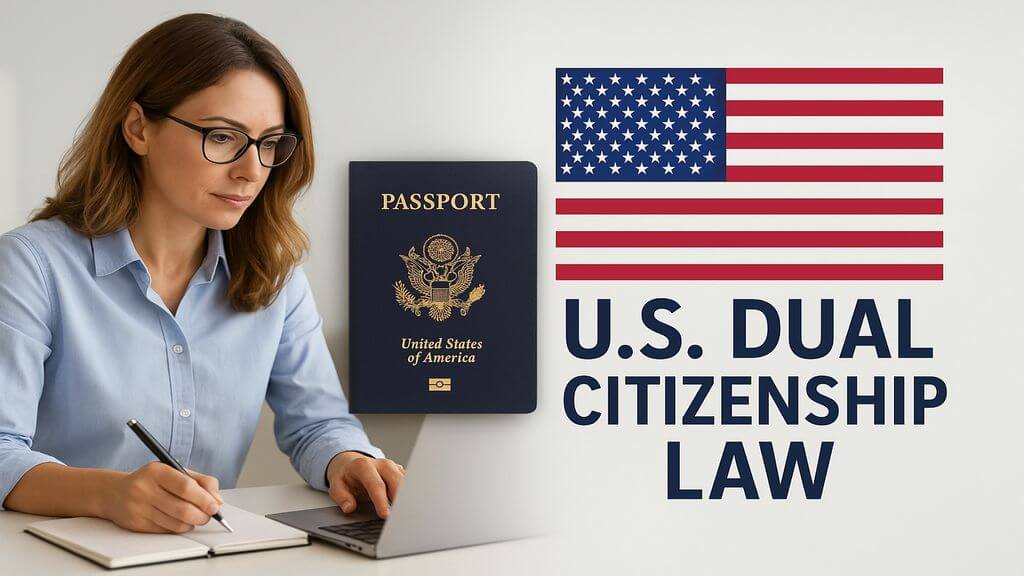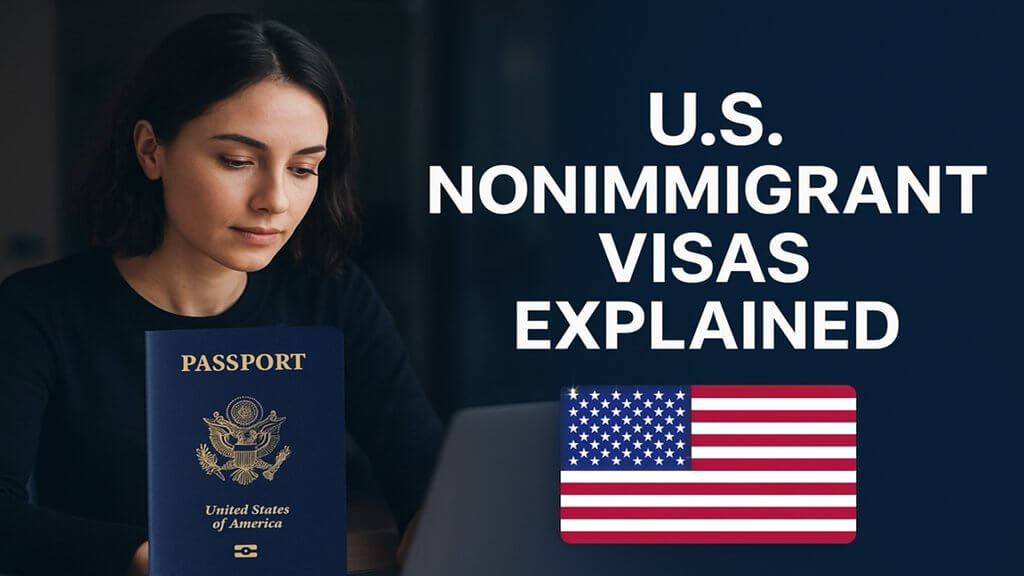Dual citizenship also called dual nationality means you are legally recognized as a citizen of two countries at the same time. In the U.S. context, this means you are a U.S. citizen while also retaining citizenship in another country.
Not all countries allow it, and rules can vary widely. Some nations automatically revoke your original citizenship once you acquire another.
Check Also: U.S Special Immigrant Visa Guide – Application Process
US Dual Citizenship:
Yes. The U.S. allows dual citizenship by default. There is no law requiring naturalized Americans to give up their citizenship in another country.
While the Oath of Allegiance includes language about renouncing loyalty to other nations, U.S. immigration law does not require you to legally surrender your other citizenship. The U.S. Supreme Court has recognized that “a person may have and exercise rights of nationality in two countries and be subject to the responsibilities of both” (Kawakita v. United States, 343 U.S. 717 (1952)).
The U.S. Department of State confirms this position in its official guidance on dual nationality.
Important: Just because the U.S. permits dual citizenship doesn’t mean your other country does. Countries like China and India generally do not recognize dual citizenship and may automatically revoke your nationality when you naturalize as a U.S. citizen.
Benefits:
Holding U.S. citizenship in addition to another citizenship can bring advantages but it also comes with obligations.
Rights in United States
- Work and Live Freely in the U.S.
As a dual citizen, you can work and reside anywhere in the United States without needing a visa or work permit. This freedom simplifies your career and lifestyle planning. - Travel Internationally with Greater Ease
Holding passports from two countries allows smoother international travel, reducing visa requirements and providing more options in emergencies or travel restrictions. - Sponsor Eligible Family Members
You can petition for certain relatives to obtain U.S. green cards, helping your family reunite or start new lives in the U.S. - Vote in U.S. Elections
Only U.S. citizens can vote in federal, state, and local elections. Dual citizenship grants you full voting rights in the U.S. - Access Educational Opportunities
You qualify for in-state tuition rates and can attend U.S. schools without international student visa hurdles, making education more affordable and accessible. - Qualify for Public Benefits
Subject to eligibility, you may access Social Security, Medicare, and other public benefits reserved for citizens. - Retain Cultural and Legal Ties
Dual citizenship helps maintain your connection to your country of origin, preserving your cultural identity and legal rights there. - Maintain Multiple Passports
Carrying two passports offers convenience, backup options during travel disruptions, and flexibility in international movement. - Benefit from Legal Protections of Two Countries
Depending on where you are, you can receive diplomatic support and legal rights from either of your countries of citizenship. - Open Business and Property Ownership Opportunities
Some countries restrict foreigners from owning property or businesses; dual citizenship can remove these barriers in both nations.
Obligations for U.S Dual Citizenship Law 2025:
- Pay U.S. taxes for life: even on income earned abroad, unless a tax treaty applies. See IRS guidance on worldwide income.
- Disclose criminal history: USCIS reviews all applications thoroughly; certain crimes can affect immigration benefits or result in loss of status.
- Register for Selective Service: males aged 18–26 must register if they lived in the U.S. or had a green card during that age range.
- Serve on a Jury duty: if called and selected.
Risks & Challenges:
Before applying, be aware of potential downsides:
- Conflicting laws: Military service, taxes, or inheritance laws in your other country could still apply to you.
- Diplomatic protection limits: The U.S. may not be able to help you if you are in your other country of citizenship.
- Security clearance restrictions: Dual nationality can limit access to certain jobs.
- Double taxation risk: Without a treaty, you may pay taxes to both countries.
American Dual Citizenship Policy:
The American dual citizenship policy allows U.S. citizens to hold citizenship in another country without automatically losing their U.S. nationality. The United States does not explicitly forbid dual citizenship, but it expects citizens to uphold their responsibilities to the U.S. regardless of other nationalities.
Key points of the policy include:
- The U.S. government recognizes but does not actively encourage dual citizenship.
- Holding dual citizenship can affect taxation, military service, and legal protections.
- Dual citizens must use their U.S. passport when entering or leaving the United States.
U.S. Citizenship and Dual Nationality:
If you acquire citizenship in another country after becoming a U.S. citizen, or vice versa, you may hold dual nationality. The U.S. State Department clarifies that dual nationality is a complex status with both benefits and challenges.
Important considerations include:
- Dual nationals owe allegiance to both countries and must comply with laws in each jurisdiction.
- In certain situations, dual citizenship can complicate legal matters such as consular protection abroad.
- Children born abroad to U.S. citizen parents may automatically acquire dual citizenship depending on the other country’s laws.
U.S. Dual Citizenship Rules and Regulations:
The U.S. dual citizenship rules do not require you to formally renounce your other citizenship(s) when you naturalize as a U.S. citizen. However, some countries may require renunciation as part of their own naturalization processes.
Other important rules include:
- Voluntarily renouncing U.S. citizenship is a formal process handled by the Department of State and is irreversible.
- Dual citizenship does not exempt individuals from U.S. tax obligations or jury duty.
- The U.S. government may consider dual citizens solely as U.S. citizens while they are in the country.
How to Get Dual Citizenship in the United States?
There is no “dual citizenship” application form. You become a dual citizen by gaining citizenship in another country while keeping your original. For foreign nationals in the U.S., the most common path is naturalization.
Steps for Naturalization:
- Check if your country allows dual nationality: Contact its embassy or consulate.
- Meet U.S. eligibility: Usually 3–5 years as a green card holder.
- Submit Form N-400: Application for Naturalization to USCIS.
- Attend biometrics and interview: Includes the civics and English tests.
- Take the Oath of Allegiance: Once approved.
Processing time: As of 2025, the average is 12–19 months, depending on the USCIS field office.
Countries’ Stance on U.S. Dual Citizenship:
| Country | Allows Dual U.S. Citizenship? | Key Notes |
|---|---|---|
| Mexico | Yes | May keep nationality; cannot hold certain offices. |
| China | No | Citizenship lost automatically. |
| Philippines | Yes (with reacquisition) | Must reapply for Filipino citizenship if lost. |
| India | No (OCI option) | OCI grants residency rights but no political rights. |
| Canada | Yes | Full recognition of dual status. |
| United Kingdom | Yes | No restrictions on holding both. |
Key Takeaways:
- The U.S. allows dual citizenship, but your other country might not.
- Benefits include work, travel, and voting rights; obligations include taxes and jury duty.
- Always research both countries’ laws before applying.
- Consult an immigration attorney if unsure mistakes can cost you your original nationality.
Frequently Asked Questions:
-
Which countries do not allow dual citizenship with the U.S.?
Countries like China and India do not recognize dual citizenship. In these countries, you may automatically lose your original citizenship upon naturalizing as a U.S. citizen.
-
Can I lose my U.S. citizenship if I become a citizen of another country?
Generally, no. The U.S. does not automatically revoke citizenship when you acquire another nationality. However, voluntarily renouncing U.S. citizenship is a separate legal process.
-
Does the United States allow dual citizenship in 2025?
Yes. The U.S. allows dual citizenship by default. You can be a U.S. citizen while also maintaining citizenship in another country, provided that country permits it.





